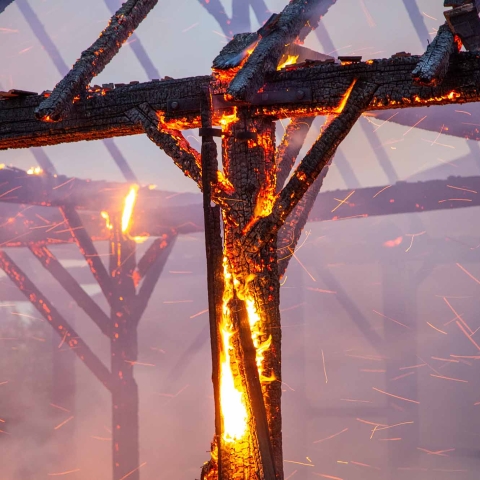Preventing Barn Fires

Fire Prevention Measures Every Barn Owner Should Know
Barns house livestock and store equipment, making them crucial to your livelihood. However, they pose significant fire risks due to the presence of combustible materials, electrical systems, and heating equipment.
Preventing barn fires requires proactive measures and a commitment to safety. Below are a few steps you can take to minimize the risk of fires and protect your property, livestock, and livelihood.
Regular Inspections
Regular inspections are the basis of fire prevention in barns. Conduct thorough inspections of electrical wiring, heating systems, and any equipment that generates heat or sparks. Signs of wear, damage, or fraying wires should be addressed to prevent potential fire hazards.
Storing Hay, Straw, and Bedding
Proper storage of combustible materials such as hay, straw, and bedding is essential for fire prevention. These materials should be stored away from electrical outlets, heaters, and other potential ignition sources. Having ventilation and keeping a safe distance between your materials can help reduce the risk of fire.
Electrical Safety
Installing electrical systems that meet current safety standards is crucial. Regular inspections by qualified electricians can identify potential hazards and help guarantee the safe operation of electrical equipment. It’s very important to not overload circuits.
Heating Equipment
Make sure to be very intentional about where you store your equipment and allow it to cool down before putting it back inside. Flammable materials should be kept away from heaters. Never leave heating equipment unattended.
Fire Extinguishers and Emergency Planning
Installing fire extinguishers in easily accessible places in your barn is vital. It's equally as important to ensure that everyone on the farm knows how to use them effectively. Clearly mark exits and practice regular drills to help prepare. Develop and practice an emergency evacuation plan, which can be a lifesaver in dire times.
Cleanliness and Maintenance
Keeping your barn clean and free of debris is a great step towards preventing fires. Accumulated dust and debris can be highly combustible, especially in areas where mechanical equipment operates. Regular cleaning and maintenance of equipment reduces the risk of mechanical failure, which can also lead to fires.
Preventing barn fires requires a thorough approach that includes regular inspections, proper storage practices, emergency planning, cleanliness, and maintenance routines. By implementing these safety measures and remaining cautious, you can significantly reduce the risk of fires and protect your property, livestock, and livelihood. Investing time and resources in prevention today can save you the heartache and stress of dealing with the destruction fire can cause to your farm.
Source: “Fire Prevention in Barns.” Penn State Extension
The information presented in this document is for informational and educational purposes only. It is intended to assist individuals, farmers, and business owners in identifying common hazards/risks and considering proactive loss prevention or loss mitigation actions. For information related to specific loss hazards, please contact your insurance agent.

